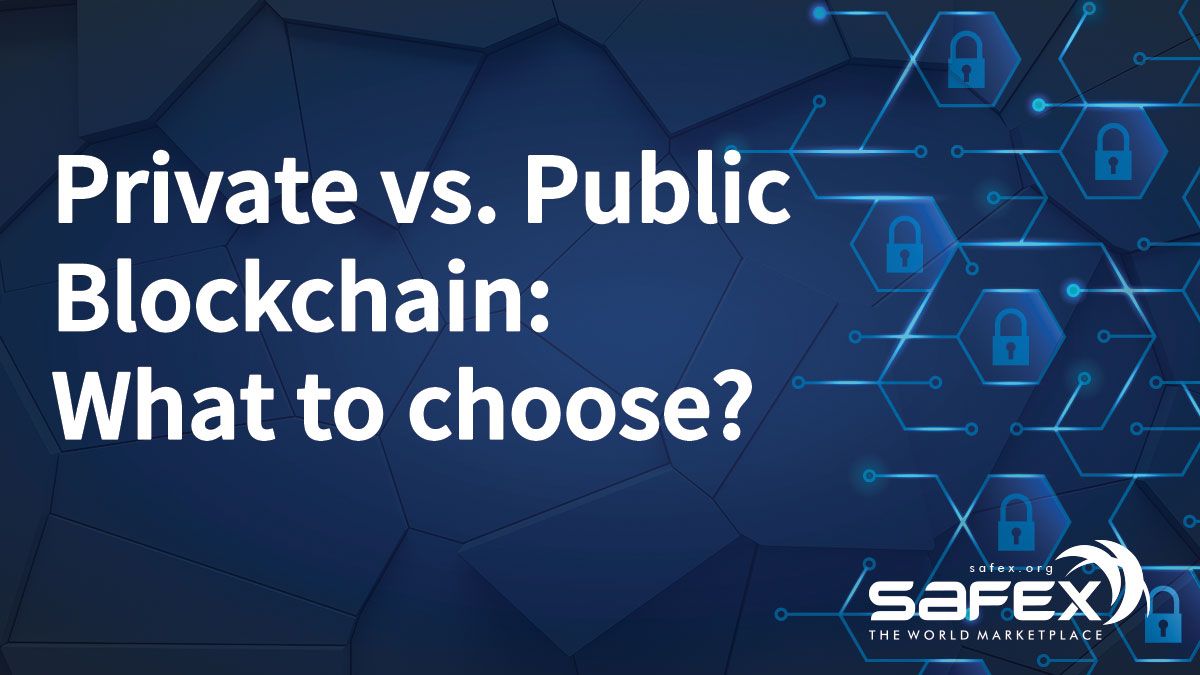Private vs. Public Blockchain: What to choose?
This article will give a short overview about the key differences between public and private blockchains, and their different features that are resulting of those. Whether you pick a private or a public blockchain for your business depends on a few reasons which will be outlined shortly.

Some time after its initiation followed by continuous development and adoption, it was clear that blockchain technology will transform the way of industry functioning overall. Literally, everyone introduced in-detail to the possibilities that this technology offers has stated that the use of blockchain-based applications will redefine companies, businesses, economies and, predictably, the state's concept.
Blockchain technology is contributing to a completely digitalized world, where every transaction or contract is an integral part of an immutable ledger, stored in transparent databases that disable any fraud, deletion, tampering or revision. Once an entry in such a ledger is made, the information can either be read by everyone or with permission needed, depending on the type of the blockchain.
The continuous adoption of this technology could also lead to a world where algorithms and machines enable easy interaction between individuals and organizations and eliminate the need of intermediaries such as lawyers, brokers and even bankers, the representatives of administrative procedures that run the world. Digital transformation and blockchain technology will not bypass any business. Whether you run an eCommerce store, a small family hotel or a bookshop, you should start thinking about how implementing blockchain technology could improve your business model and welcome the change prepared.
The following article will present you with the key differences, similarities, advantages and disadvantages between a private and public blockchain and help you decide which one to choose according to your business needs.
Private vs. public blockchain
Depending on the operating model, business type and business size, a particular company can choose from the existing variants of blockchain protocols. There are four ways of how a blockchain-based platform can be set up:
- Public and open (permissionless writing and reading)
- Public and closed (permissionless writing, permissioned reading)
- Private and open (permissioned writing, permissionless reading)
- Private and closed (permissioned writing and reading)
Public blockchain
A public blockchain has got an open network, and all the information is available in the public domain. This means that the data is accessible to all and that any party can read the data stored on the blockchain or add new entries to it by submitting transactions to the network. However, once an entry is validated, it cannot be modified or deleted. A public blockchain is decentralized, meaning no centralized third-party will supervise or control the data. The public type of blockchain is perfect for all types of public sectors, such as healthcare, trade or education.
A public blockchain system is used by Bitcoin, Ethereum, Safex and Litecoin, and is considered as the original distributed ledger structure.
Here is an example of how a public blockchain can be used for creating new opportunities that are revolutionizing the existing ways of trade:
Using various advantages of the public blockchain system, a blockchain-based, open-source platform for eCommerce - Safex World Marketplace powered by Safex, which is a perfect solution for all online businesses that are ready for the next stage of innovation based on blockchain and data privacy features - has been developed. At The World Marketplace online shopping with cryptocurrency is already possible! As a business owner, you can easily set up your eCommerce store and start offering your services and products with this blockchain-based application. Utilizing this public blockchain will enable you to reach the global market and numerous customers as a result.
Private blockchain
A private blockchain, or so-called consortium blockchain, is exclusively accessible by users via invitation-only, meaning that the data stored on a private blockchain can not be seen, read or written without proper permission.
A private blockchain is run and maintained by a single entity that controls the accessibility level of the particular data since a private blockchain keeps multilayer characteristics, meaning that the different users might not have the same permissions over the data stored on it. A private blockchain is a perfect choice for all specific sectors such as finances or government services requiring a high level of security and privacy.
Since a private blockchain is the perfect solution for storing and sharing all kinds of confidential transactions and data within a limited circle, it is the reason why we recommend it for all B2B parties or intra-business use, ensuring that only team members of a particular company will have access to the data and can be a part of the blockchain.
Private vs. public blockchain: Security Issues
Blockchain technology itself stands for high security standards and protocols that are working reliable due to their tested, mostly open-source codebases and decentralized consensus algorithms. Relying on numerous network participants that authorize the changes in the distributed ledger, creating a new master copy accessible to everyone - with or without permission, depending on the blockchain type - and enabling completely immutable storage of data, is something that both public and private blockchain provide to its users.
However, a public blockchain has a slight advantage regarding security issues compared to private ones. A public blockchain is completely decentralized, which means that all the data is stored on a big number of servers since anyone in the world can participate in the network. This significantly increases the level of immutability and censorship resistance. A reorganization of a blockchain's entries would require a malicious actor to have 51% of the network's consensus power, which is also harder to achieve for a public blockchain. Furthermore, a public blockchain is particularly resistant to distributed denial-of-service – DDoS – attacks.
On the other hand, compared to a public one, a private blockchain is more vulnerable because of the possibly lower number of nodes and a single entity controlling the whole network. In contrast to traditional security protocols, private blockchains are yet more powerful and secure because of the strong cryptography used and the auditability of added entries. However, many critics emphasize that private blockchains are not structured on the vital blockchain value of decentralization, claiming that private blockchains are actually nothing more than centralized databases that use distributed ledger technology.
Private vs. public blockchain: Final comparison
When making a final choice between a private or public blockchain for your business, be aware that the most valuable indicator will be the type, size and needs of your business.
Whenever you want to build your business globally and reach a larger number of potential customers, a public blockchain will be the perfect fit for this aim.
In contrast, a private blockchain suits the goal of building a business with specific B2B partners and sharing processes and data exclusively among them.
Either way, we have summarized the major advantages & disadvantages of private vs. public blockchain use based on common operating principles.
Accessibility
- A public blockchain is an open network anyone can access, built on the principles of equality.
- A private blockchain is restricted and limited to the particular invitation-only members.
Costs
- A public blockchain supports its users with lower transaction costs compared to traditional transaction tariffs.
- A private blockchain provides its users' a significant cost reduction per transaction, compared to a public blockchain.
Equality
- In a public blockchain, each node has the same right to verify a transaction.
- In a private blockchain, only specific nodes have permission to verify new transactions and blocks.
- Public blockchains use proof-of-work or proof-of-stake protocols for adding a new block.
- In private blockchains, adding a new block is possible only for pre-approved participants.
Speed
- A public blockchain supports its users with a higher speed of transaction submission and settlement compared to traditional methods, which require up to five days to process the transaction.
- A private blockchain provides its users with faster transaction settlements compared to the public blockchains since there are significantly fewer users on a private blockchain network due to access restrictions.
Read more about eCommerce on our blog.
